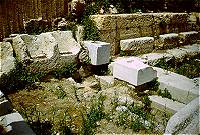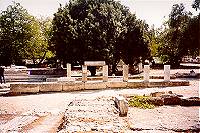Introduction
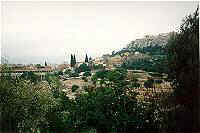 Although his accusers have not spoken the truth, Socrates says he will. But while they use “flowery language…decked out with fine words and phrases,” Socrates will defend himself “in the same language which it has been my habit to use, both around the trading stalls of the market place (where many of you have heard me) and elsewhere…” (37).Socrates refers here to the Agora (left), the large open area in the heart of ancient Athens where people came to conduct business or visit temples or relax and engage in more casual interactions in the many open areas. Plato mentions the agora as a frequent haunt for Socrates in many dialogues.
Although his accusers have not spoken the truth, Socrates says he will. But while they use “flowery language…decked out with fine words and phrases,” Socrates will defend himself “in the same language which it has been my habit to use, both around the trading stalls of the market place (where many of you have heard me) and elsewhere…” (37).Socrates refers here to the Agora (left), the large open area in the heart of ancient Athens where people came to conduct business or visit temples or relax and engage in more casual interactions in the many open areas. Plato mentions the agora as a frequent haunt for Socrates in many dialogues.
| Stoa Basileos | Eponymous Heroes Monument |
Indeed, in the dialogue that leads into the Apology – the Euthyphro – Socrates discusses the nature of justice with Euthyphro outside the Stoa Basileos (upper left), or “Royal Stoa,” since he is awaiting to appear before the King Archon (in charge of religious matters) on the charge of impiety. The charge was then posted on the public noticeboard in front of the statues of the Eponymous Heroes (upper right). In our second dialogue – the Apology – Plato presents the trial of Socrates, in which Socrates is given an opportunity to refute the charges against him. The setting of the third and fourth dialogues in the series is his jail cell in Athens’ prison. In the Crito, Socrates explains his refusal to escape from jail, and in the Phaedo, he executes his own death sentence by voluntarily drinking a cup of poison hemlock. We know exactly what room Socrates was in in the jail, for he goes into an adjoining room to bathe, sparing his undertakers that task. There is only one room in the prison that adjoins a bath (illustration pending).
OK – Back to the Apology:
Section A:
Socrates explains that he will refute the charges unfairly brought against him and do so within the time limit. Socrates refers to the habit of Athenian courts using a water clock, or klepsydra, to time speakers. Here are two types of klepsydra: (1) an actual Athenian klepsydra – Agora museum – used in exactly the situation Socrates describes and (2) a fixed (not portable) klepsydra on site at Oropos, site of a cult of the local hero Amphiaraeus. The size of the klepsydra determines the length of time it is meant to measure.
Socrates repeats the two main charges that have been brought against him (39): “Socrates is committing an injustice, in that he inquires into things below the earth and in the sky, and makes the weaker argument defeat the stronger, and teaches others to follow his example.” In effect, he denies being a cosmologist (or pre-Socratic philosopher) who seeks physical explanations rather than divine ones for everyday phenomena, and he denies being a sophist, who teaches his students to use slick rhetoric and “unjust logic” to avoid responsibility and obligation. Socrates rightly claims that he was unfairly portrayed as such by the playwright Aristophanes in his 423 BC comedy, The Clouds as a teacher of “unjust logic” to those seeking a way to weasel out of their financial obligations. Socrates hopes that the jurymen will judge Socrates by their experience of him, rather than by such libelous portrayals of what he actually does.
Section B:
Socrates refutes the charge that he is a sophist by denying that he is “expert in perfecting the virtues of people in a society” and furthermore by refusing to accept money from the “students” he does have. Socrates pleads ignorance of what makes men “good.”
Section C:
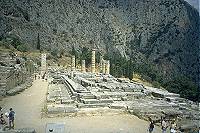 Socrates explains that far from being irreligious, he is in fact on a mission from god (so that’s where the Blues Brothers got it from…) to justify the Oracle of Delphi: “Well, one day [Chaerephon] actually went to Delphi and asked this question of the god…what he asked was whether there was anyone wiser than myself. The Pythian princess replied that there was no one.” Socrates explains that “I realized with distress and alarm that I was making myself unpopular, but I felt compelled to put the god’s business first; since I was trying to find out the meaning of the oracle, I was bound to interview everyone who had a reputation for knowledge.”
Socrates explains that far from being irreligious, he is in fact on a mission from god (so that’s where the Blues Brothers got it from…) to justify the Oracle of Delphi: “Well, one day [Chaerephon] actually went to Delphi and asked this question of the god…what he asked was whether there was anyone wiser than myself. The Pythian princess replied that there was no one.” Socrates explains that “I realized with distress and alarm that I was making myself unpopular, but I felt compelled to put the god’s business first; since I was trying to find out the meaning of the oracle, I was bound to interview everyone who had a reputation for knowledge.”
So Socrates interviewed politicians, poets, and craftsmen, but he found that none of them showed wisdom. So Socrates concluded that the Oracle was indeed right: no man is wiser than Socrates because only Socrates admits that he is not wise at all. Unfortunately, Socrates’ method caused many powerful, wealthy, and well-situated men to resent him for revealing their ignorance, and it is false charges born of that resentment that has brought him to this court today. One suggestion Socrates gives to the jury is that they consider his “adventures as a cycle of labours undertaken to establish the truth of the oracle once and for all,” evoking an image of Herakles, the great pan-Hellenic hero who had to perform a series of twelve labors also at the instigation of a god (Hera) in a ritual right of purification (for murdering his family in a fit of madness).
An apt comparison?
Section D:
The results of Socrates’ interrogations are odium (for proving men’s ignorance and rubbing their noses in it), poverty (proof that he is no sophist!), a following of young students (the younger generation loves to make their parents look bad), and a reputation for corrupting them (of course, those in power consider Socrates’ teaching the youngsters to question authority as politically subversive). And he claims that he goes around proving to people that they are not wise out of his devotion to the god Apollo, who has revealed the truth of the matter with his oracle.
Section E:
Socrates identifies his accusers as practitioners of occupations defamed by his study. How to make friends and influence people…not!
Section F:
Cross-Examination (Socrates addresses Meletus directly) – again, Socrates repeats the charges against him and then refutes them one by one by using the Socratic Method that made him famous.
Socrates gets Meletus to admit that he makes the ludicrous claim that “the whole population of Athens has a refining effect upon the young, except [Socrates]; and [Socrates] alone corrupt[s] them.” He then proves that this argument wouldn’t work with horse-trainers, so why should it work with educators of people? Socrates concludes that Meletus has obviously not given the matter of the education of the young any thought whatsoever, thereby weakening his charge that Socrates is guilty of corrupting the minds of the young.
Socrates next argues that no man commits evil intentionally, for everyone knows that such an act would bring the wrath of the community down upon him. Therefore, if he did commit an evil act, he did so unintentionally. The proper procedure to follow in such a case would be to instruct the individual on how to act for the good, not to drag him into court. Socrates concludes with another accusation that Meletus has brought charges against Socrates out of spite: “But you deliberately avoided my company in the past and refused to enlighten me, and now you bring me before this court, which is the place appointed for those who need punishment, not for those who need enlightenment.”
Section G:
The Cross-Examination continues: Socrates tricks Meletus into admitting a contradiction: that he charges Socrates with both atheism (not believing in gods at all) and with teaching his students “to believe in new deities instead of the gods recognized by the state,” thereby destroying Meletus’ credibility. Socrates rightly points out that Meletus has confused him with a cosmologist named Anaxagoras, who was exiled from Periclean Athens for suggesting that the sun was actually “a white-hot rock about the size of the Peloponnesus” instead of the god Apollo in his sun-chariot. Galileo will suffer a similar fate (state-ordained exile, or house-arrest) for a similar reason (rejecting the religion-driven law of the state in favor of natural explanation)…in AD 1632.
Section H:
Socrates persists in the idea that the threat of death should not dissuade a just man from seeking justice, that by being faithful to principles of good and justice that transcend our reality rather than to a desire for wealth, or glory, or power, we live a good life: “This I do assure you, is what my god commands; and it is my belief that no greater good has ever befallen you in this city than my service to my god; for I spend all my time going about trying to persuade you, young and old, to make your first and chief concern not for your bodies or for your possessions, but for the highest welfare of your souls, proclaiming as I go, ‘Wealth does not bring goodness, but goodness brings wealth and every other blessing, both to the individual and to the state.'”
Section I:
Socrates makes several important points: “I do not believe that the law of God permits a better man to be harmed by a worse. No doubt my accuser might put me to death or have me banished or deprived of civic rights; but even if he thinks, as he probably does (and others too, I dare say), that these are great calamities, I do not think so; I believe that it is far worse to do what he is doing now, trying to put a man to death unjustly. For this reason, gentlemen, far from pleading on my own behalf, as might be supposed, I am really pleading on yours, to save you from misusing the gift from God by condemning me. If you put me to death, you will not easily find another to take my place.” Socrates then describes himself as a gadfly, sent by the gods to prick the Athenians into paying attention to important matters, as opposed to politics, advancement and materialistic gains. Socrates suggests that his own poverty and lack of station in life (and even his neglect of his own family) is due to his devoted attention to saving the rest of them.
Section J:
Socrates reveals that he acts in response to a little voice in his head, a daimonion (not to be confused with demon – a daimonion is a supernatural force, more than just his conscience). Socrates knows he is doing the right thing because his diamonion has not spoken up against his actions. Socrates also rejects the idea that one can be involved in politics and remain just; that is why he has disdained political activity. As a citizen of Athens he fought as a hoplite (in three battles: Potidaea, Delium, and Amphipolis), but he had bad political experiences under both the democracy and the Rule of the Thirty (a short-lived oligarchy that overthrew the democracy):
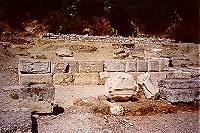 First, he once served on the boule, the council that prepared legislation for the Assembly. The occasion was the disastrous naval campaign of 406 BC, where ten Athenian ships were lost in the process of winning the Battle of Arginusae, and many men were lost because a storm prevented their rescue. Eight of the ten presiding strategoi were present at the battle, and six returned to Athens. They were immediately arrested and popular opinion demanded that they all be tried and executed en masse. Socrates sums up his own reaction: “On this occasion I was the only member of the executive who opposed your acting in any way unconstitutionally and voted against the proposal…”
First, he once served on the boule, the council that prepared legislation for the Assembly. The occasion was the disastrous naval campaign of 406 BC, where ten Athenian ships were lost in the process of winning the Battle of Arginusae, and many men were lost because a storm prevented their rescue. Eight of the ten presiding strategoi were present at the battle, and six returned to Athens. They were immediately arrested and popular opinion demanded that they all be tried and executed en masse. Socrates sums up his own reaction: “On this occasion I was the only member of the executive who opposed your acting in any way unconstitutionally and voted against the proposal…”
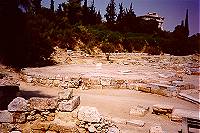 “When the oligarchy came into power, the Thirty Commissioners in their turn summoned me and four others to the Round Chamber and instructed us to go and fetch Leon of Salamis from his home for execution…Powerful as it was, that government did not terrify me into doing a wrong action; when we came out of the Round Chamber the other four went off to Salamis and arrested Leon, and I went home. I should probably have been put to death for this, if the government had not fallen soon afterwards.”
“When the oligarchy came into power, the Thirty Commissioners in their turn summoned me and four others to the Round Chamber and instructed us to go and fetch Leon of Salamis from his home for execution…Powerful as it was, that government did not terrify me into doing a wrong action; when we came out of the Round Chamber the other four went off to Salamis and arrested Leon, and I went home. I should probably have been put to death for this, if the government had not fallen soon afterwards.”
Section K:
Socrates points to his consistency in action – he never has “countenanced any action that was incompatible with justice on the part of any person.” He also denies that he has ever “taught” anybody anything. People engage him in conversation because “they enjoy hearing me examine those who think that they are wise when they are not; an experience that has its amusing side.” He proves that the charge of “corrupting the youth” is bogus by pointing out that not one of his “students” will speak out against him.
Section L:
Socrates refuses to put on a show of tears for the court, or to cart out his family in a plea for mercy for it would be unjust to earn the acquittal of a court based on anything
other than the hard facts of the case.
Section M:
As Athenian law states, the jury of 500 listened while both sides spoke. Now that the jury has come back with a guilty verdict (280-220), according to Athenian law, each side is now allowed to suggest a penalty, and then the court will choose the more appropriate of the two. Meletus suggests death as the penalty, and Socrates offers no realistic alternative to the jury.
Socrates explains that he has always been different, since he was never interested in the things most people care about: making money, having a comfortable home, high military or civil rank, and all the other activities – political appointments, secret societies, party organizations – which go on in our city.
Instead, Socrates says he does what he considers the greatest possible service: “I tried to persuade each one of you not to think more of practical advantages than of his mental and moral well-being, in the case of the state or of anything else.”
What does he think he deserves? To be treated like state hero! He suggests that he should receive a reward for his trouble, the same reward given to Olympic victors (free dining in the Prytaneum).
Why does he feel this way? Because he says, “I am convinced I never wrong anyone intentionally…so being convinced that I do no wrong to anybody, I can hardly be expected to wrong myself by asserting that I deserve something bad, or by proposing a corresponding penalty.”
Socrates considers the alternatives to the death sentence, but admits that his love of life does not outweigh his love of principle. He considers and rejects the option of banishment: “A fine life I should have if I left this country at my age and spent the rest of my days trying one city after another and being turned away every time!” He concludes that he won’t be able to win in a foreign city, for if he refuses to speak with the youth, they will forcibly exile him, and if he does speak with the youth, their elders will have him run out of town.
He considers the possibility of spending the rest of his life in quiet contemplation, but concludes that this would be “disobedience to God” since it would prevent him from cultivating his soul. Here Socrates presents very clearly his mission in life: to teach others “to let no day pass without discussing goodness and all the other subjects about which you hear me talking and examining both myself and others…and that life without this sort of examination is not worth living.”
He then offers to pay a fine which will cause him no harm to pay, but it is quite small. He accepts his friend’s offer to pay a large amount of money, but this is later rejected by the jury because it is not a hardship for Socrates and so isn’t a very good punishment.
Section N:
Socrates explains that the jurymen will be blamed for their actions by their enemies, and that his own reputation will benefit from their ill treatment of him (martyr syndrome?) Socrates, too, blames the jury for this bad outcome, pointing to their blindness: “I suggest, gentlemen, that the difficulty is not so much to escape from death (which he eventually must face whether he begs for his life now or not); the real difficulty is to escape from wickedness…” Socrates admits that he “shall go away condemned by you to death” but that his accusers “will go away convicted by Truth herself of depravity and injustice.” Socrates is pleased with the outcome.
Socrates addresses his condemners: “As soon as I am dead, vengeance shall fall upon you with a punishment far more painful than your killing me…you will have more critics.” This is Socrates argument against getting rid of people who disagree with you. In the end, the destroyers will be destroyed.
Socrates addresses those who voted to acquit him: “I suspect that this thing that has happened to me is a blessing, and we are quite mistaken in supposing death to be an evil…Death is one of two things:Either it is annihilation, and the dead have no consciousness of anything; or it is really a change: a migration of the soul from this place to another.” Socrates suggests that if the Underworld is as the poets have said, he looks forward to the opportunity to speak with “other heroes of the old days who met their death through an unjust trial, and it compare my fortunes with theirs – it would be rather amusing, I think – and above all I should like to spend my time there, as here, in examining and searching people’s minds, to find out who is really wise among them, and who only thinks that he is.”
And my favorite example of Socratic irony: “At any rate, I presume that they do not put one to death there for such conduct.”
Socrates ends his Apologia by summing up his major beliefs:
“Nothing can harm a good man either in life or after death and his fortunes are not a matter of indifference to the gods.” In other words, there is a plan, we do have our place in the divine plan, and goodness will prevail even in the face of evil. Socrates remains true to his principles by forgiving his condemners, because after all, he is the one who said that no man commits evil intentionally. But he does ask that if his sons behave badly (i.e., by putting money or anything else beyond goodness), that they plague his sons the way he plagues them. In this way, “I shall have had justice at your hands – I and my children.” And then he fearlessly goes off to meet his Death.
D. Anthony Storm has one of the best Plato sites on the internet. Visit it today!
